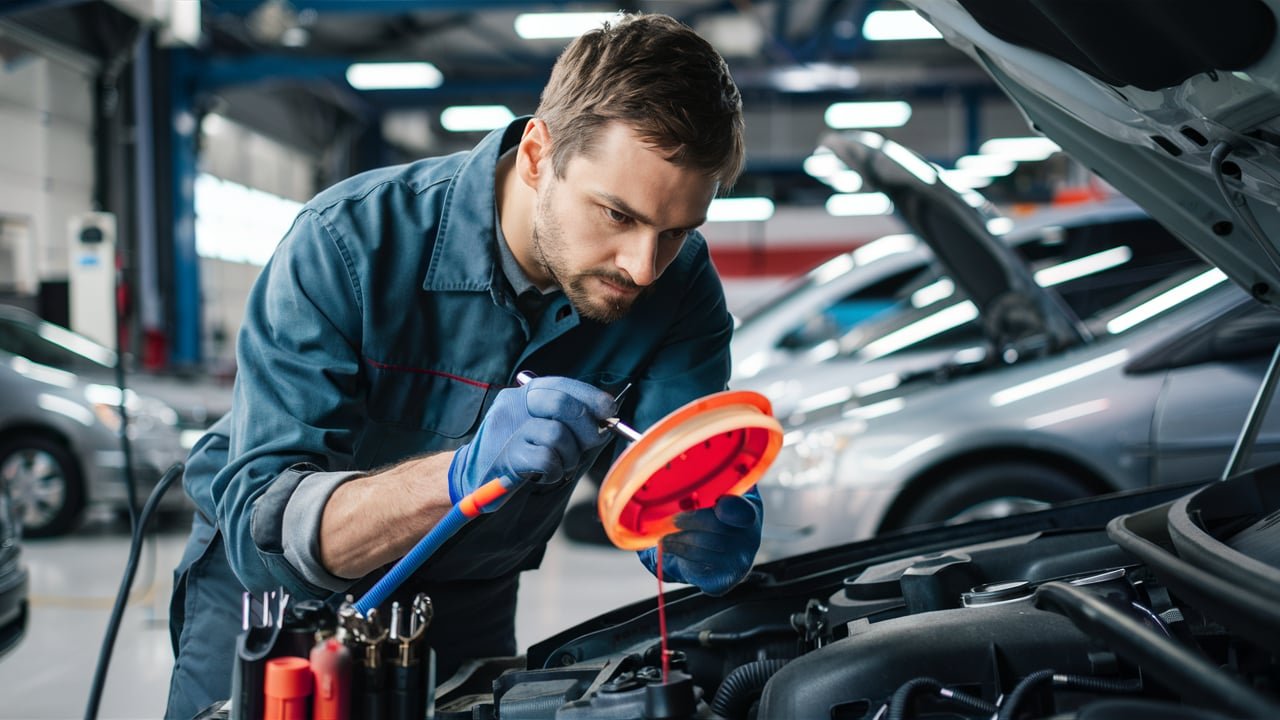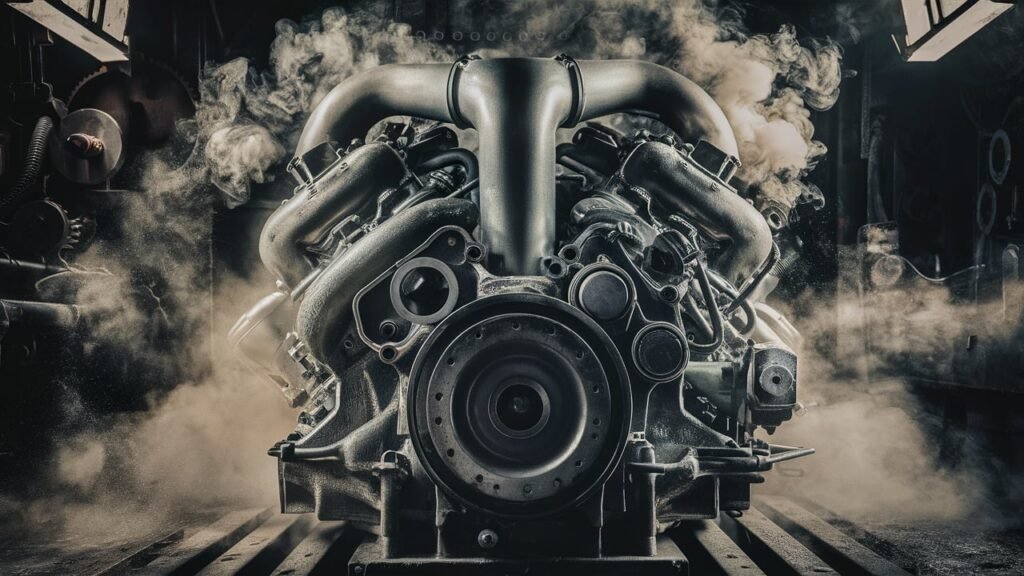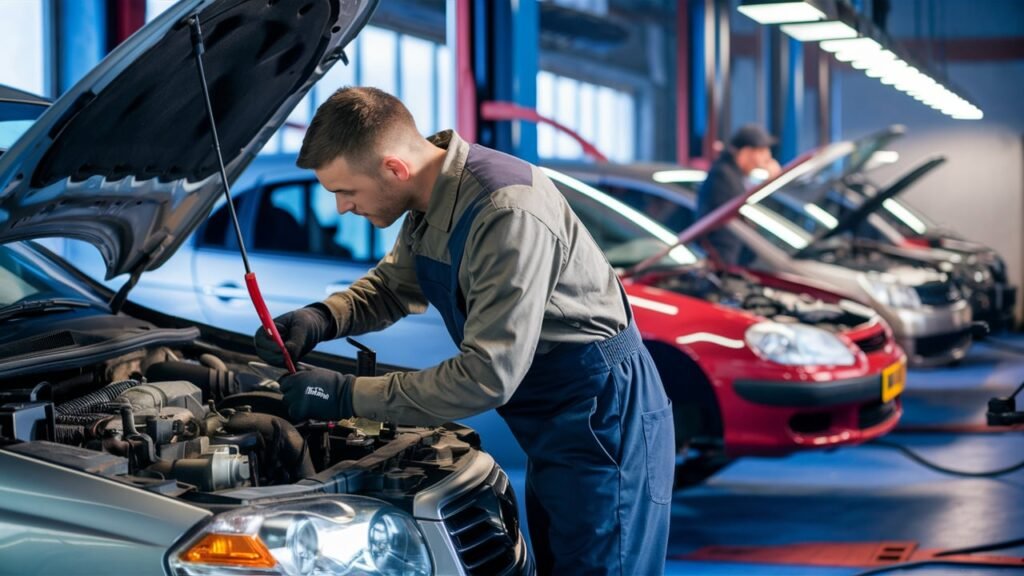
7 Vital Reasons Why You Need a Car Engine Brake Fluid Inspection!
Attention, all car owners and automotive enthusiasts! Have you ever considered the critical role that brake fluid plays in the safety and performance of your vehicle? As we delve into the realm of car engine maintenance, one often underrated yet crucial aspect that demands our attention is regular brake fluid inspections.
Neglecting this fundamental element can have severe consequences, jeopardizing not only your safety on the road but also the overall efficiency of your braking system.
Imagine a scenario where each press on your brake pedal lacks the assured precision it once had, or worse, fails to bring your vehicle to a halt when needed most. This nightmare could easily become a reality if we disregard the significance of monitoring and maintaining optimal brake fluid levels.
By exploring why routine inspections are imperative, we uncover not just minor inconvenience but rather potential disasters waiting to unfold if preventative measures are overlooked. Stay tuned as we unveil seven vital reasons why your next car engine brake fluid inspection should be at the top of your priority list – because safe travels begin with proactive care.
Importance of Brake Fluid Inspection.
Regular brake fluid inspections play a crucial role in maintaining the optimal functioning of your vehicle’s braking system, ensuring both safety and performance on the road. By monitoring the levels and quality of your brake fluid, you can detect any signs of contamination or deterioration early on.
Imagine driving down a steep hill only to realize that your brakes are not responding as they should due to degraded brake fluid. Such a scenario highlights the importance of proactively assessing and replacing brake fluid to prevent potential brake failures.
Contaminated or old brake fluid can lead to various issues such as decreased braking efficiency, spongy pedal feel, or even complete brake failure in extreme cases. Without proper inspection and maintenance, these problems can escalate quickly and compromise your ability to stop safely.

To put it into perspective, think about how vital it is for your car to come to a halt promptly in emergency situations – reliable brake fluid is key to making this happen. Regular inspections serve as a preventive measure against such risks, giving you peace of mind knowing that your brakes are in top working condition.
Moreover, proper functioning brakes are not just about stopping power but also about control and responsiveness while driving. Monitoring the quality of your brake fluid ensures that your braking system operates smoothly, providing precise control over deceleration when needed.
This is especially critical during sudden stops or maneuvers where split-second reactions could mean the difference between avoiding an accident or being involved in one. Investing in routine brake fluid inspections is essentially investing in both your safety and the overall performance of your vehicle on the road.
Safety Benefits.
Regular brake fluid inspections play a pivotal role in enhancing road safety for both drivers and pedestrians. By adhering to a consistent maintenance schedule, car owners can ensure that their braking system operates reliably when needed the most.
Imagine driving down a busy highway during rush hour when suddenly faced with an unexpected obstacle ahead. The ability of your brakes to respond quickly and effectively in such critical moments can be directly tied to the quality of your brake fluid, underscoring the importance of routine inspections.
Moreover, neglecting brake fluid checks might lead to unforeseen accidents caused by faulty brakes. Picture yourself approaching a red traffic light at an intersection only to find that your brakes are unresponsive due to contaminated or deteriorated brake fluid.
A scenario like this underscores how failure to maintain proper brake fluid levels and condition through regular inspections could have dire consequences on road safety. Preventing such incidents starts with a simple yet crucial step – ensuring the health of your braking system through timely examinations of your brake fluid.
By conducting scheduled brake fluid inspections, drivers not only safeguard themselves and other road users from potential accidents but also instill confidence in their vehicle’s ability to stop promptly when required.
Keeping the braking system in optimal condition reduces the risk of sudden malfunctions or failures while on the road, fostering a safer driving environment for everyone. Ultimately, investing time and effort into monitoring and maintaining brake fluid quality serves as an essential pillar in upholding overall road safety standards across diverse driving conditions and scenarios.
Performance Enhancement.
Ensuring your car’s braking system operates at its peak performance is critical not only for your safety but also for the vehicle’s overall efficiency. By maintaining clean and functional brake fluid, you can significantly enhance your braking performance and responsiveness.
Imagine driving down a steep hill – the confidence of knowing that your brakes will respond promptly and effectively can make all the difference in ensuring a smooth and safe descent. Clean brake fluid plays a vital role in transmitting pressure to engage your brakes properly, providing you with the stopping power you need precisely when you need it.
When brake fluid degrades or becomes contaminated, it loses its ability to transmit pressure effectively within the braking system. This inefficiency can lead to a loss of stopping power, delayed response times, or even spongy pedals – all of which compromise your ability to control the vehicle safely.
Picture needing to make a sudden stop in an emergency situation; inadequate brake fluid could delay your vehicle’s response time and increase the risk of an accident. By proactively monitoring and maintaining the quality of your brake fluid through regular inspections, you are safeguarding against these performance-related issues.
Furthermore, degraded brake fluid can introduce air bubbles or moisture into the system, resulting in reduced braking efficiency. In extreme cases, this deterioration can lead to complete brake failure – a scenario no driver ever wants to encounter.
By prioritizing routine brake fluid inspections, you are actively preventing scenarios where inefficient braking systems jeopardize both your safety on the road and your car’s overall performance. Remember, when it comes to ensuring optimal performance from your vehicle’s brakes, regularly checking and maintaining the quality of your brake fluid is non-negotiable.
Cost Savings in the Long Run.
Regular inspections and maintenance of your car’s brake fluid can lead to significant cost savings in the long run. Neglecting to check and replace brake fluid when needed can result in expensive repairs or replacements down the line.
For instance, contaminated or degraded brake fluid can cause damage to crucial braking components such as the master cylinder or calipers, leading to costly fixes. By investing in routine brake fluid inspections, you are essentially preventing these potential damages and avoiding the hefty bills that come with major brake system repairs.
Furthermore, ensuring optimal conditions for your brake fluid through timely inspections can extend the lifespan of various braking components. For example, by keeping the fluid clean and at the right level, you reduce wear and tear on components like brake pads and rotors.

This not only saves you money on premature replacements but also ensures that your braking system functions efficiently for a longer period. Ultimately, taking care of your brake fluid through regular check-ups is a proactive measure that pays off by preventing avoidable expenses associated with neglected maintenance.
By prioritizing regular brake fluid inspections, you are not just maintaining the safety and performance of your vehicle but also safeguarding your wallet from unnecessary expenditures. The small cost of periodic inspections pales in comparison to what you could potentially spend on extensive repairs caused by overlooked brake fluid issues.
Think of it as an investment in both your car’s longevity and your financial well-being, where a little upfront expense can translate into substantial savings over time. Remember, a stitch in time saves nine – or rather, a timely brake fluid inspection saves dollars in future repair costs.
Early Detection.
Early detection is key when it comes to maintaining the health of your vehicle’s braking system. Routine brake fluid inspections play a critical role in identifying minor issues before they evolve into major problems that could compromise your safety on the road.
For instance, during a regular brake fluid check, a technician may notice early signs of corrosion on brake lines or connections. Addressing these minor issues promptly can prevent leaks or failures that might lead to more extensive damage down the line.
Minor leaks in the braking system, if left unchecked, can escalate quickly and result in brake fluid loss, affecting your ability to stop effectively. By conducting routine inspections as part of your maintenance regimen, you can catch these small leaks early on and have them repaired before they cause significant harm.
Imagine the scenario of overlooking a tiny leak in the brake lines—a situation that could worsen over time until one day, you find yourself struggling to bring your car to a halt safely. This emphasizes how crucial early detection through regular brake fluid checks is for ensuring optimal braking performance and your own safety as a driver.

Moreover, early identification of issues such as contaminated brake fluid can save you from expensive repairs later on. For example, spotting signs of water contamination in the brake fluid during an inspection allows you to address the issue promptly.
Failure to address this problem could lead to internal corrosion in critical components like calipers or cylinders, resulting in costly replacements. The adage “a stitch in time saves nine” truly applies here—addressing small concerns immediately through regular brake fluid inspections can prevent larger repair bills and keep your braking system functioning at its best.
To put it simply, treating brake fluid inspections as proactive measures rather than reactive responses can make a significant difference in prolonging the lifespan of your vehicle’s braking components.
By catching issues early through routine checks and maintenance, you not only protect yourself and others on the road but also save yourself from unexpected expenses that could arise from neglecting this essential aspect of car care.
Compliance with Manufacturer Recommendations.
Staying in line with the manufacturer’s recommended brake fluid inspection intervals is not just a bureaucratic checkbox; it plays a crucial role in preserving your vehicle’s warranty and performance standards.
Imagine disregarding these guidelines and experiencing a braking issue, only to find out that it could have been prevented through timely fluid checks recommended by the experts who designed your car. By following these intervals diligently, you ensure that your braking system remains in optimal condition, meeting the high standards set by those who know your vehicle best.
Manufacturers establish maintenance schedules for a reason – to uphold the safety and functionality of your vehicle. For instance, certain high-performance vehicles may require more frequent brake fluid inspections due to the demands placed on their braking systems during spirited driving.
Neglecting these recommendations could compromise not only your warranty coverage but also the overall efficiency of your brakes. A simple act of adhering to manufacturer guidelines speaks volumes about your commitment to maintaining your vehicle at its peak performance levels.

When you prioritize compliance with manufacturer recommendations for brake fluid inspections, you’re essentially contributing towards extending the lifespan of critical braking components. Think of it as a proactive approach to safeguarding your investment in a reliable and efficient braking system.
By aligning with suggested maintenance schedules, you’re taking actionable steps toward ensuring that every element within the braking mechanism works harmoniously, allowing you peace of mind when navigating challenging road conditions or sudden stops.
Ultimately, choosing to honor these guidelines positions you as an informed and responsible car owner dedicated to maximizing both safety and longevity for your vehicle’s vital systems.
DIY vs Professional Inspection.
When it comes to inspecting your car’s brake fluid, the question of whether to opt for a DIY approach or rely on professional mechanics often arises. While conducting basic maintenance tasks at home can save you time and money, some aspects are best left to experts.
Professional mechanics bring specialized knowledge and equipment to the table, enabling them to carry out thorough brake fluid inspections efficiently. For instance, they have access to tools like brake fluid test strips that provide accurate readings of the fluid’s condition, which may be challenging for a DIY enthusiast to procure.
Car owners should consider seeking professional help for brake fluid assessments in certain situations. If you notice irregularities in your braking system’s performance or suspect issues with the brake fluid but aren’t confident in diagnosing the problem yourself, consulting a mechanic is wise.
Professionals can pinpoint underlying problems quickly, preventing potential safety hazards that might arise from inaccurately assessing the situation. Additionally, professional inspections can uncover hidden issues like internal corrosion in brake lines or master cylinders that DIY methods might overlook.
Choosing professional inspection services also ensures that any necessary repairs or maintenance tasks related to the brake system are handled effectively. Mechanics possess years of experience and training that allow them to address complex brake fluid issues with precision.
In contrast, attempting intricate repairs without adequate expertise could worsen the problem or lead to further damage down the line. By entrusting professionals with these crucial inspections, car owners can rest assured that their vehicle’s braking system is in reliable hands, maintaining optimal safety on the road.
Environmental Impact Consideration.
When discussing the importance of car engine brake fluid inspections, it’s crucial to remember the environmental impact associated with proper disposal practices. The way car owners handle old brake fluid during maintenance activities can significantly contribute to environmental conservation efforts.
Improper disposal of brake fluid can lead to contamination of soil and water sources, posing a threat to ecosystems and wildlife. By ensuring that old brake fluid is disposed of responsibly at designated recycling centers or through authorized waste management facilities, car owners play a vital role in reducing their ecological footprint.
Emphasizing the responsibility that car owners have in minimizing their ecological impact serves as a reminder of the interconnectedness between vehicle maintenance practices and environmental well-being.

Simple actions like avoiding pouring old brake fluid down drains or into the ground can make a substantial difference in preserving our natural surroundings. Additionally, promoting awareness about proper disposal methods for hazardous automotive fluids can help educate others within the community about sustainable practices related to vehicle care.
For instance, envision a scenario where multiple car owners neglect proper brake fluid disposal after DIY inspections; this cumulative effect could lead to widespread environmental contamination over time.
By highlighting how individual actions collectively influence broader environmental health, this discussion aims to inspire proactive measures among car enthusiasts toward eco-friendly automotive maintenance routines.
Ultimately, by considering the environmental impact of routine brake fluid inspections and disposal practices, car owners can actively contribute to sustainability efforts while ensuring optimal vehicle performance and safety.
Conclusion – The Essential Role of Brake Fluid Inspections.
Ensuring your car’s braking system is in optimal condition is not just a matter of convenience; it’s a critical aspect of road safety and vehicle performance. Regular inspections of your car engine brake fluid can prevent accidents, enhance braking efficiency, and save you money in the long run. By prioritizing this maintenance task, you are actively taking control of your safety and that of others on the road.
Remember, neglecting routine brake fluid checks can lead to disastrous consequences, such as brake failures or costly repairs. Don’t underestimate the impact that clean and properly maintained brake fluid can have on your vehicle’s overall performance and longevity.
Make it a habit to schedule regular inspections with professionals who understand the importance of this often-overlooked component. Your safety and peace of mind behind the wheel are worth every drop of brake fluid attention!




